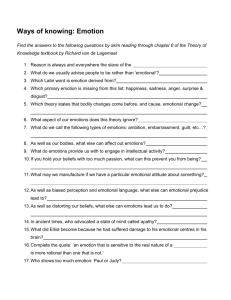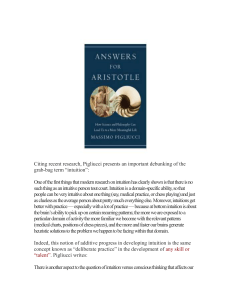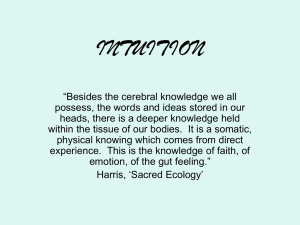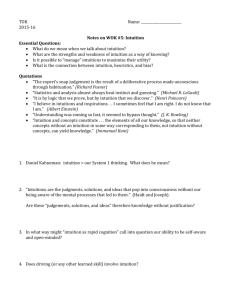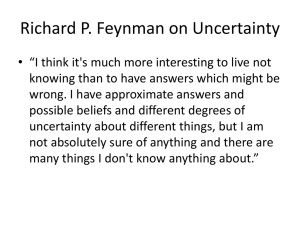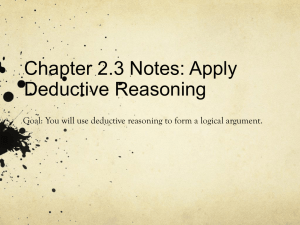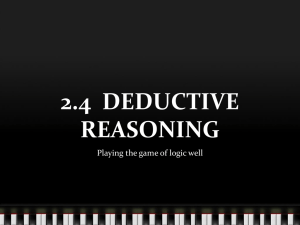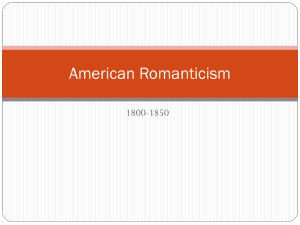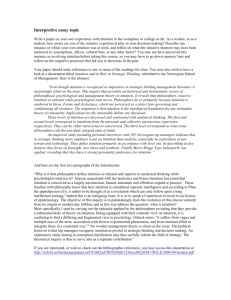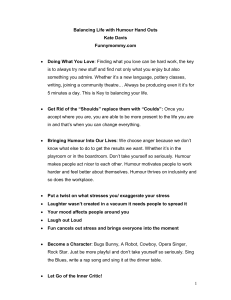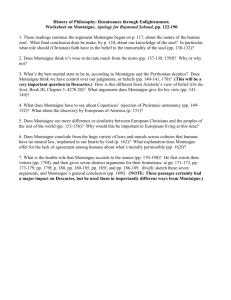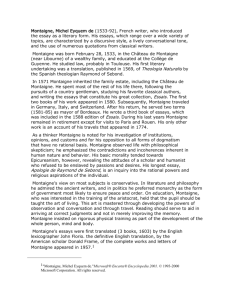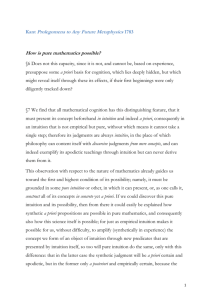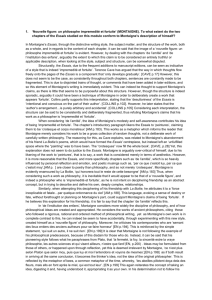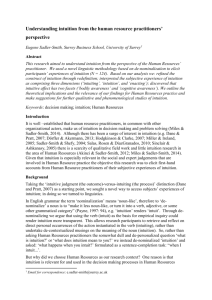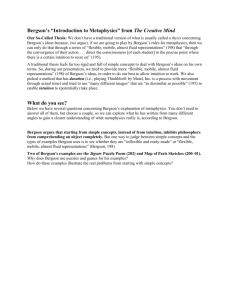A QUESTION OF VALUES
advertisement
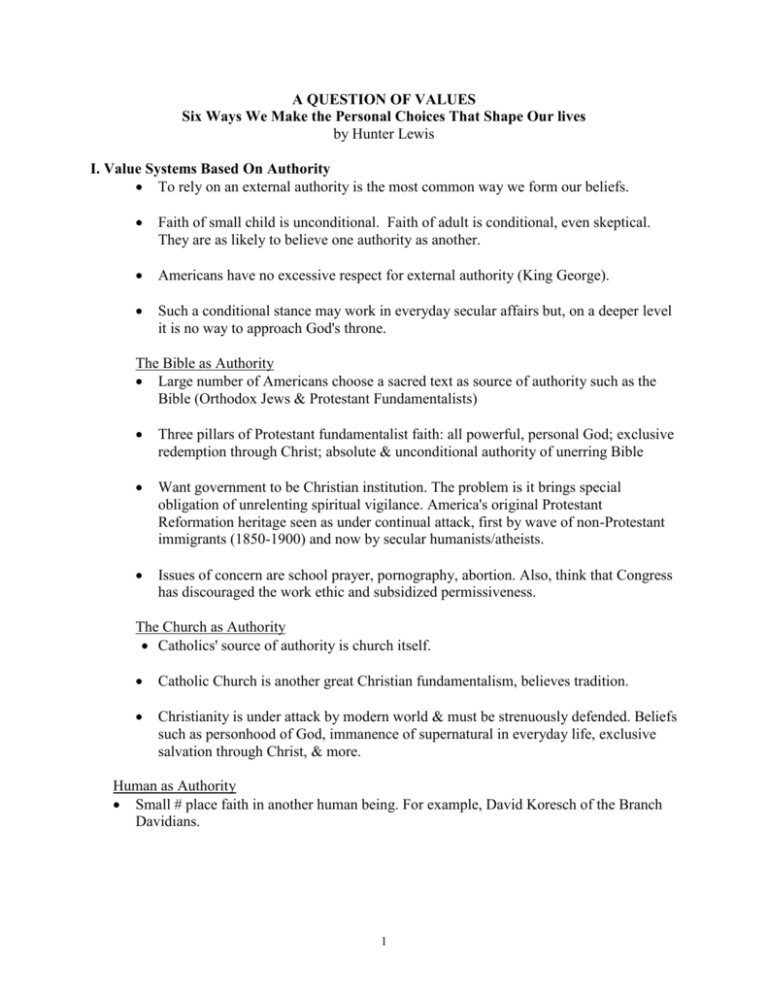
A QUESTION OF VALUES Six Ways We Make the Personal Choices That Shape Our lives by Hunter Lewis I. Value Systems Based On Authority To rely on an external authority is the most common way we form our beliefs. Faith of small child is unconditional. Faith of adult is conditional, even skeptical. They are as likely to believe one authority as another. Americans have no excessive respect for external authority (King George). Such a conditional stance may work in everyday secular affairs but, on a deeper level it is no way to approach God's throne. The Bible as Authority Large number of Americans choose a sacred text as source of authority such as the Bible (Orthodox Jews & Protestant Fundamentalists) Three pillars of Protestant fundamentalist faith: all powerful, personal God; exclusive redemption through Christ; absolute & unconditional authority of unerring Bible Want government to be Christian institution. The problem is it brings special obligation of unrelenting spiritual vigilance. America's original Protestant Reformation heritage seen as under continual attack, first by wave of non-Protestant immigrants (1850-1900) and now by secular humanists/atheists. Issues of concern are school prayer, pornography, abortion. Also, think that Congress has discouraged the work ethic and subsidized permissiveness. The Church as Authority Catholics' source of authority is church itself. Catholic Church is another great Christian fundamentalism, believes tradition. Christianity is under attack by modern world & must be strenuously defended. Beliefs such as personhood of God, immanence of supernatural in everyday life, exclusive salvation through Christ, & more. Human as Authority Small # place faith in another human being. For example, David Koresch of the Branch Davidians. 1 II. Value Systems Based On Logic Focuses on deductive logic as a “way of knowing.” Technique for clarifying thoughts and speech, employs Socratic method, dialectic, syllogism. Ultimate truth is not to be found in church or Bible but rather in deductive reasoning. Order and consistency are all important in human affairs. Must be continually tested by drawing finer and finer distinctions. Syllogism - a logically deduced conclusion from 2 premises invented by the Greeks. Buddha - first 3 Noble Truths: Human life is full of suffering. Suffering is caused by desire. Suffering can be eliminated by eliminating desire. B. Russell’s antimony on the “Barber” (p.45) Criticism of logic is it’s a series of meaningless puzzles Has nothing to do with common sense or real world (Hitler was “logical” about Jews in his warped way.) Socrates sought truth by eliminating error, but negative form could be criticized as inconsistent, sows seeds of anarchy. Spinoza: "evils arise from the love of what is perishable" Concept of perfection was all-important initial premise His "ontological argument" for God's existence: To be perfect God must be. But for Spinoza God is the universe not its Creator. Cosmo (lst Cause), Teleo (lst organizer) Adler: "We ought to desire what is good for us and nothing else." Uncertainty, pessimism, etc. are just philosophical mistakes, erroneous views. Deductive logic is not only a source of true knowledge, it is through logic we are able to understand everything else we know and attain wisdom. Most take the option of combining logic with another mode. Aquinas blended logic with authority of the Bible. III. Value Systems Based On Sense Experience Empiricists ask whether the alleged truth corresponds to their own entirely personal sense experience in this world. If not, the alleged truth is quietly but decisively put aside. Montaigne (16th Century) - invented the essay - an attempt to gain self-knowledge. Devotee of high sense experience, a reflective, systematic kind of empiricism. A man who reveals himself as a man who does not stick to the subject, and who does so brilliantly." Essays "that care little where they start, go or end up" An honest stream of selfrevelation. A bold repudiation of both authority and logic. 2 Religious authority: best approach according to Montaigne. What people really need is an independent, spirit tempered by humility and modesty. Such a person may choose to worship God, but not an angry God. About logic: the deductive method is all "preambles, definitions, classifications, etymologies and disputes about words. Criticizes Christianity and logic as abstractions with wearisome habit of drawing distinctions and rendering judgments. Whatever problem or questions arises, there is a commandment, a recipe. Montaigne says we operate under a veil of ignorance in general and in value judgments. Moral evidence should be concrete and personal not abstract or organizable. Best guide is common sense depending on the circumstances. We must find our own way, no true authorities, dependency is self-destructive. (directly at odds with Christian thought). Empirical reasoning - patient, steady accumulation of facts drawn from personal sense experience. Never rely on other's opinions but base decisions on information. At odds with Christian fundamentalism: "body exercises great sway"- hedonism. In high sense experience, sense experience, is both the means and the end. Truth is not what we find at the end, it is the quest. Prodigal Sense Experience: adolescent immaturity prolonged Ex. Merton, Tennessee Williams IV. Value Systems Based on Emotion "Feelings" - a positive connotation, "Emotions" - a negative. This is an unfortunate occurrence. "Trust Your Feelings, Luke." Emotion as a value mode: the human faculty for knowing by feeling, especially refined feeling, the kind of knowledge people care deeply about, that they can build a community on, are prepared to defend, may be childish but may be magnetic, forceful. We think and judge and believe through our emotions. Value systems based on emotions: "Americanism" focuses on particular group of "chosen" people; propounds particular way of life like free enterprise; requires emotional stimulus - an enemy-a devil-a disease. These aspects define a tribe. Group (Security) Way of Life (Identity) Tribe (Community)* 3 Enemy (Stimulation) *Scott Peck says community is a kind of tribe, one transcending selfishness and expressing love. Examples: political campaigns, Cold War – “evil empire”, family of farmers, Race - KKK, Habitat for Humanity Tribe - committed to each other, united by a cause-often animosity for outsiders ("us vs. them thinking") Emotion can lead to social activism which is a “knock-off” of Christianity. Difference is that activists' paradise is earth. Devotees who rely solely for meaning in their lives make a tragic mistake. Criticism of emotional value system is that it is illogical. Also can beget barbarism (Hitler). Churchill is a counter-example, "to fight on the side of angels." V. Value Systems Based on Intuition While emotion and intuition may both be aspects of the unconscious mind, emotion is childlike and animalistic while intuition is a highly developed and powerful mode of purely abstract thinking, one that synthesizes masses of facts and theories with extraordinary speed. We all rely on it to form some of our personal beliefs, values. Dr. Banting (diabetes) "his head a whirling maze of conflicting theories, went wearily to bed, got up at 2 am, wrote 3 sentences. His conscious mind had come to grips with one of the most baffling problems in medical science; his subconscious mind finished the job." Russell (philosophy) "throughout 1913 thought about this topic, concentrated with such intensity that I sometimes forgot to breathe and emerged panting as from a trance. But all to no avail, could perceive fatal objections to every theory. Went on a holiday, next morning suddenly saw exactly what I had to say, proceeded to dictate the whole book without a moment's hesitation" Newton (science) "his gift was the power of holding continuously in mind a purely mental problem until he had seen straight through it" Eight steps to "stimulating muscles of intuition" (classical yoga) -secret seems to lie in not trying too hard after consciously thinking about something very hard. Important insights - intuition is nonverbal; we are often intuitive at first before assuming garb of reasoning VI. Values Systems Based on Science Science is an amalgam of 3 elements: sense experience, intuition, logic. But it is a unique mode because it is so exact and demanding. 4 No religion can ever be scientific in exact sense (Geib - "who was there to observe creation?") Religious truths cannot be tested by measurable and repeatable experiments, certainly not by controlled laboratory experiments. Nonetheless, we can still approach religious questions by trying to gather as many relevant facts as possible, even biased “facts” which are not logically self-contradictory. To seek “hidden knowledge.” Freud - defense theory - cognitive psychology; behavioral psychology Skinner thinks humans are moved by external forces only) Your Word for the Day: socio-demo-anthro-eco-enviro-techno model building Composite religion of science - even the most devout Christians have absorbed its allpervading essence Lewis: "in real life the six value systems blend and interact" 5

